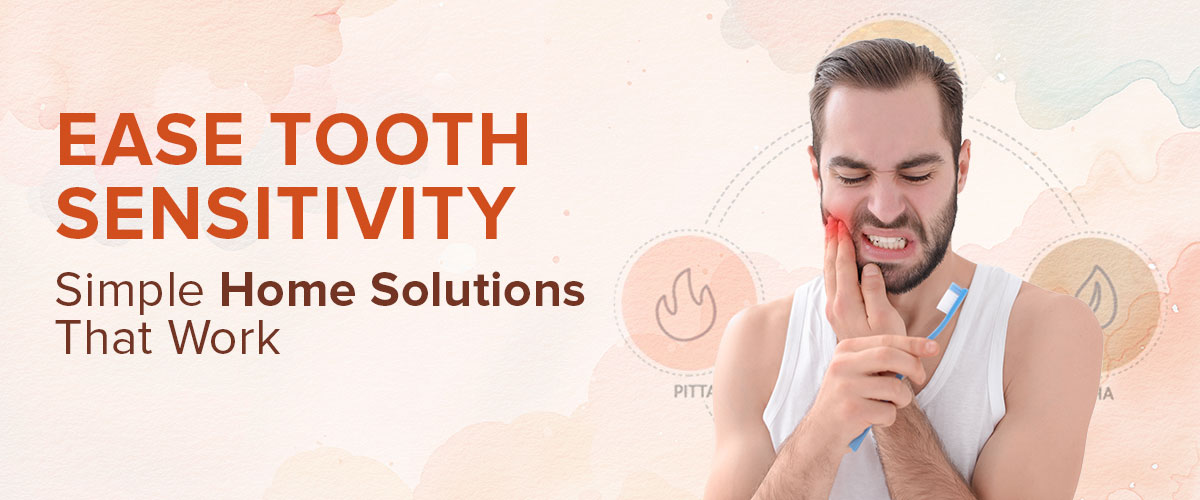Home Remedies for Sensitive Teeth

Ever bitten into a scoop of ice cream or sipped a hot drink and felt a sharp pain in your teeth? If so, you are not the only one. Sensitive teeth can make even ordinary pleasures uncomfortable. This tooth disorder is called dentin hypersensitivity, which impacts millions of individuals worldwide. It happens when the dentin (the foundation level of your teeth) gets exposed, leading to pain whenever you consume hot, cold, or acidic food.
Therefore, managing sensitive teeth is essential for comfort and general dental health. Home remedies are a natural and practical method to ease this discomfort without regular trips to the dentist. These remedies are easy to prepare and simple to use, and therefore are a great option for anybody seeking relief with readily available home ingredients.
What Are Sensitive Teeth?
Sensitive Teeth are a common dental issue (dentin hypersensitivity). It happens when the dentin (the softer layer beneath your hard outer enamel) gets exposed. This exposure could cause discomfort or pain when consuming warm, cold, acidic or sweet foods and drinks. The symptoms of sensitive teeth include a sharp, abrupt pain which shoots into the nerve endings of the teeth.
But why does it occur? Several factors can lead to sensitive teeth. Enamel erosion, tooth decay, cracked teeth, cavities, or recent dental treatment including whitening or fillings might lead to increased tooth sensitivity.
Detecting and managing tooth sensitivity requires understanding these causes and symptoms of sensitive teeth. Luckily, there are simple methods to treat it at home that offer relief and help you enjoy drinks and meals without pain.
What Causes Sensitive Teeth?
Tooth sensitivity may be a temporary issue but it stems from conditions which are more persistent. Knowing the various causes of sensitive teeth can help you manage or prevent it. Here are the main causes of this typical dental problem.
Enamel Erosion: This is the most common reason behind sensitive teeth. Enamel might erode from food items and drinks which are acidic (soda, citrus fruits, and wine). Aggressive teeth brushing with tough bristles or abrasive toothpaste also wears down the enamel.
Gum Recession: Gums might recede because of age, periodontal disease, or poor brushing which exposes the delicate root surfaces to external stimuli.
Tooth Decay & Cavities: Decay exposes the inner layers of the tooth causing greater sensitivity. The gum line has the greatest potential for sensitivity due to cavities.
Cracked Teeth: Cracks in teeth might be contaminated with germs from plaque and cause inflammation in the pulp of the tooth, leading to sensitivity.
Recent Dental Procedures: Treatments such as teeth cleaning, dental implants or teeth whitening temporarily boost tooth sensitivity.
Grinding or Clenching Teeth: This habit, called bruxism, can wear down enamel and expose the dentin underneath.
Build-Up of Plaque: Excessive plaque may cause enamel erosion and gum disease, which may lead to sensitivity.
Addressing these elements, whether through diet changes, better oral hygiene habits or natural remedies could reduce the discomfort of sensitive teeth.
Home Remedies and Tips
Tooth sensitivity can be irritating but many home remedies can relieve the pain and help manage the condition. These remedies are simple to make and mostly require ingredients that you might already have at home.
Desensitising Toothpaste: Using a toothpaste designed for sensitive teeth could help block pain from dentin exposure. These toothpastes commonly have potassium nitrate or stannous fluoride that helps strengthen tooth enamel and reduce pain. Brush with the toothpaste twice a day.
Salt Water Rinse: A salt water rinse can alleviate tooth sensitivity and promote oral health. Dissolve 1 / 2 teaspoon of salt in a cup of hot water. Swirl this solution around in your mouth for thirty seconds and spit it out. This cure works well as salt is an antiseptic which reduces inflammation and heals mouth wounds.
Hydrogen Peroxide Mouthwash: Equal parts 3% hydrogen peroxide and water make a mild disinfectant mouthwash. Swirl it around your mouth for thirty seconds and rinse with normal water. Hydrogen peroxide decreases gum inflammation and kills bacteria that may result in teeth sensitivity.
Honey & Warm water: Honey has antibacterial qualities. Mix some honey with hot water and rinse your mouth with it to reduce inflammation and soothe pain due to sensitive teeth.
Green Tea: Green tea possesses anti-inflammatory and antioxidant compounds which strengthen gums and teeth. Use unsweetened green tea as a mouthwash two times daily to enjoy these benefits.
Turmeric: Turmeric has curcumin which makes it useful for its anti-inflammatory properties. Create a paste of turmeric powder with some water and apply it straight to the gums or rub it on your teeth to minimise sensitivity and soothe inflamed tissues.
Capsaicin: Capsaicin, which tends to make chili peppers hot, can actually help reduce pain. You can use capsaicin in gel form or add a pinch of ground chili pepper to water to make a mouthwash. It might burn at first, however with continued use, the sensitivity may reduce.
Coconut Oil Pulling: Another conventional cure is swishing coconut oil in your mouth for about 10-15 minutes before spitting it out. This helps remove plaque and alleviate inflammation, which might ease sensitivity.
Clove Oil: Clove oil is a pain reliever & is particularly good for sensitive teeth. Add just a little clove oil in a carrier oil like coconut oil and use it with a cotton swab on the sensitive areas.
Use these natural, home remedies every day to ease tooth sensitivity and boost your dental health.
Each of these treatments can help in managing sensitive teeth so you can take pleasure in your favourite foods and beverages without discomfort & pain.
Lifestyle and Diet Recommendations
Managing tooth sensitivity generally demands more than treatment of the symptoms. Additionally, it means making lifestyle and dietary changes to stop the condition from worsening. Here are some tips on how to alter your everyday habits and diet to better control sensitive teeth.
Limit Acidic Foods & Beverages: Acidic food and drinks like citrus fruits, tomatoes, and carbonated drinks wear away tooth enamel with time. Lower your consumption of these to protect your teeth.
Avoid Extreme Temperature Foods: Very hot or cold foods and beverages can result in tooth sensitivity. Let your food and beverages come to a reasonable temperature before serving.
Use a Soft Bristled Toothbrush: Brushing with a hard toothbrush wears down enamel and also increases sensitivity. Switch over to a soft bristled toothbrush and be gentle while brushing to avoid additional harm to your enamel.
Maintain Good Oral Hygiene: Brush two times per day and floss often to keep your teeth and gums in good health. Good oral hygiene helps avoid sensitivity & conditions like gum disease and tooth decay.
Quit Tooth Grinding: If you grind your teeth, put on a night guard during the night. Teeth grinding could wear down enamel and increase sensitivity.
Chew Sugar Free Gum: Chewing gum stimulates saliva production, which neutralises acid and supplies minerals to repair the enamel.
With these changes in your everyday routine, you can bring down your risk for teeth sensitivity and boost your general oral health. These lifestyle and diet recommendations help with sensitive teeth and promote stronger, healthier teeth and gums.



 Prev
Prev

































































